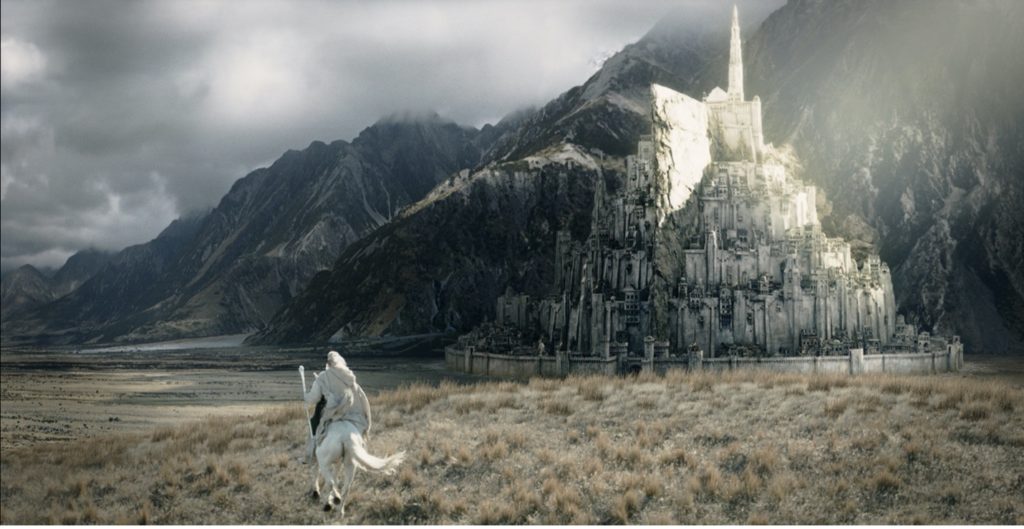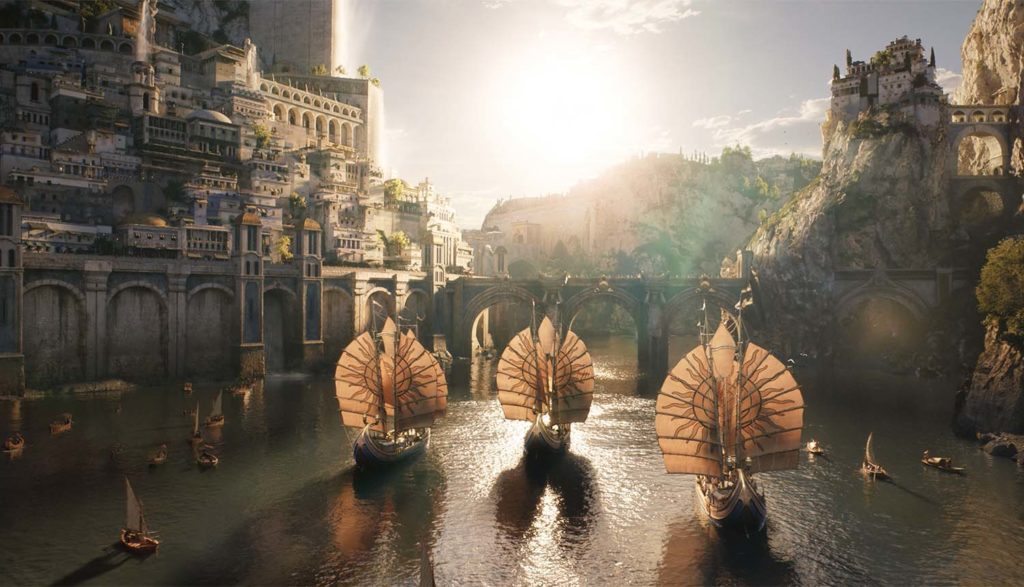The first season of Amazon Prime Video’s lavish Lord of the Rings: The Rings of Power comes to a close today, as the streaming service releases the season’s final episode. And Amazon tells us that a lot of us will be watching. During the series’ first 24 hours of release, 25 million people watched, already making it Amazon’s most-watched show ever.
While the series certainly has taken liberties with J.R.R. Tolkien’s original thoughts on the Second Age, it retains quite a bit of them, too. And as the first season of Amazon’s The Rings of Power draws to a close, I can’t help but think about how inherently religious Tolkien’s work is.
I know what some of you are probably thinking the moment you read the title of this blog post: “Tolkien was opposed to allegory.” That’s true, and I won’t imply that Númenor (the island kingdom that forms a central setting in Rings of Power) is allegory in the sense that Tolkien intended it to represent a hidden meaning. What is undeniable, however, are the many parallels between the Kingdom of Judah and Númenor.
This shouldn’t surprise us, really. In The Letters of J.R.R. Tolkien, Tolkien writes that “The Lord of the Rings is of course a fundamentally religious and Catholic work; unconsciously so at first, but consciously in the revision,” continuing on to explain that “the religious element is absorbed into the story and the symbolism” rather than referenced outright (Letter 142).
And it isn’t hard for Christians to point out moments of Tolkien’s work that seem to follow a distinctly Christian theology. We see it everywhere in The Lord of the Rings trilogy itself: Gandalf dying as he defeats a Balrog and being raised from the grave into power and glory imitating Christ defeating sin and death. The irresistible pull of the Ring even as it actively corrupts those who wield it imitating our desire to sin despite its wicked consequences. Frodo, carrying that burden to its ultimate destruction in order to save the world imitating Christ bearing our sins in his body—and by His wounds we are healed.
So, no, The Lord of the Rings doesn’t make direct references to the members of the Trinity, but it’s clear that portions of his writings line up strikingly close to Christian belief—and the island nation of Númenor is no exception, its history (in my mind) mimicking the biblical Kingdom of Judah.

An Island of Monotheists with a Central Place of Worship
In the show, we hear Númenóreans occasionally make reference to “the gods,” but that is a bit misleading.
Tolkien writes in a letter (which scholars now call Letter 165) that the “Númenóreans thus began a great new good, and as monotheists; but like the Jews (only more so) with only one physical centre of ‘worship’: the summit of the mountain Meneltarma ‘Pillar of Heaven.’” True, in Tolkien lore, there are many gods called the “Valar,” but these are more akin to Christian angels (or as Tolkien refers to them in Letter 153, “created spirits—of high angelic order we should say, with their attendant lesser angels—reverend, therefore, but not worshipful.”) They’re a pantheon of servants created by “the One,” Eru Ilúvatar.
It was this Eru alone that the Númenóreans worshipped, and it was only at the sacred top of Meneltarma where these ceremonies took place. “…It was named the Meneltarma, the Pillar of Heaven, and upon it was a high place that was hallowed to Eru Ilúvatar, and it was open and unroofed, and no other temple or fane was there in the land of the Númenóreans” (The Silmarillion, Akallabêth).
In fleeing into the West from the Dark Lord Morgoth’s domain in Middle-Earth in the First Age (Rings of Power takes place, as mentioned, in the Second), Tolkien writes that the Númenóreans “escaped from ‘religion’ in a pagan sense, into a pure monotheist world, in which all things and beings and powers that might seem worshipful were not to be worshipped, not even the gods (the Valar), being only creatures of the One” [Emphasis mine]. Thus, because Eru had created the Valar, the Númenóreans only worshipped him.

A People with a High Priest
This second section is where it gets really interesting, as Tolkien’s Númenórean tradition blends the role of priest and king into one—a biblical concept introduced with Melchizedek (Gen. 14) and culminating in Christ’s role as the perfect prophet, priest and king (Heb. 1:1-3). This king-priest idea was prominent in Númenórean history, and Tolkien notes in Letter 156 that “when the ‘Kings’ came to an end (referencing the downfall of Númenor) there was no equivalent to a ‘priesthood’: the two being identical in Númenórean ideas.”
And how exactly did this priest-king function? In a similar way to how Judah’s high priest would. In Tolkien lore, the sacred mountain Meneltarma was so holy that no one was allowed to speak on it—save for the priest-king, who would, three times a year, summit Meneltarma to offer prayer, praise and thanksgiving (Unfinished Tales, Part 2, Ch 1, “Description of the Island of Númenor”).
Granted, there are some differences between Tolkien’s priests and biblical priests: namely, others were still allowed to join the priest-king atop the mountain (unlike how only the high priest could enter the Most Holy Place), and the priest-king goes up three times a year rather than the biblical high priest entering the Most Holy Place just once per year (Heb. 9:7). But these differences go entirely away by the time Aragorn arrives and reclaims the role of priest-king (as he is the rightful king of Númenor).
In Tolkien’s The Return of the King, Aragorn enters a hallow in Mindolluin, the big mountain next to Minas Tirith. Tolkien writes that the hallow was “only approachable by the King, where he had anciently offered thanks and praise on behalf of his people” (Letter 156), much more similar to the biblical description. Furthermore, Tolkien writes “that with the reemergence of the lineal priest-kings…the worship of God would be renewed, and His Name (or title) be again more often heard.” We’ll discuss an idea related to that last quote in our final section.
A People Who Rejected God and Pursued Wicked Gain
If you know anything about Israel’s relationship with God, it’s that they continuously desired other gods to worship and false paths to walk. Despite God’s faithfulness, the nation would constantly turn towards the idols of the nations around them. They rejected the way of their ancestors, instead turning to their own selfish desires. Consider God’s harsh words to Judah through the prophet Jeremiah:
“For thus says the Lord of hosts: ‘Cut down her trees; cast up a siege mound against Jerusalem. This is the city that must be punished; there is nothing but oppression within her. As a well keeps its water fresh, so she keeps fresh her evil; violence and destruction are heard within her; sickness and wounds are ever before me. Be warned, O Jerusalem, lest I turn from you in disgust, lest I make you a desolation, an uninhabited land.’”
Jeremiah 6:6-8
The Númenóreans followed a similar path.
When their island nation was raised from the sea, the Númenóreans were faithful to Eru, and they saw blessings as a result. But over hundreds of years, the people began to despise Eru’s commandments: namely, the Ban of the Valar, which forbid the nation from sailing westward (to the Undying Lands, where men are not allowed and the Valar dwell). Instead, the nation turned to a different “god”: Sauron, who disguised himself and poisoned the mind of Númenórean King Ar-Pharazôn (yes, that guy who is Queen Regent Míriel’s advisor in Rings of Power).
This poisoning was successful, however, not because Sauron’s words were true, but because Ar-Pharazôn’s mind was weak, turned against Eru and desiring the forbidden. The nation listened to Sauron because they wanted to live forever, and they believed worshipping Morgoth (as set forth by Sauron) would help them in that goal. Sauron even got the nation to build a temple to Morgoth, where they offered human sacrifices to the Dark Lord and persecuted those who remained faithful to Eru. This led to the Númenor’s ultimate destruction.
This mimics Judah’s turning from God in order to serve Baal for false ideas of blessing, which Jeremiah tells Jerusalem is the reason for God’s wrath against them. “Thus says the Lord of hosts, the God of Israel: ‘Behold, I am bringing such disaster upon this place that the ears of everyone who hears of it will tingle. Because the people have forsaken me and have profaned this place by making offerings in it to other gods whom neither they nor their fathers nor the kings of Judah have known; and because they have filled this place with the blood of innocents, and have built the high places of Baal to burn their sons in the fire as burnt offerings to Baal, which I did not command or decree, nor did it come into my mind…And in this place I will make void the plans of Judah and Jerusalem’” (Jer. 19. 3b-5, 7a).

A People Who Ignored the Divine Warnings
But it wasn’t as if the people weren’t able to see it coming. Both the Kingdom of Judah and Númenor were given warnings which allowed them to turn away from doing evil. Unfortunately, both chose to ignore the divine messages.
Let’s first take a look at how God warned Judah.
Thus says the Lord: “Stand by the roads, and look, and ask for the ancient paths, where the good way is; and walk in it, and find rest for your souls. But they said, ‘We will not walk in it.’ I set watchmen over you, saying, ‘Pay attention to the sound of the trumpet!’ But they said, ‘We will not pay attention.’ Therefore hear, O nations, and know, O congregation, what will happen to them.”
Jeremiah 6:16-18
Judah chose to reject the opportunities God provided for them to turn away from following an evil path. They refused the history and wisdom of their forefathers and the law (ancient oaths), which proved God was better than their way. And when God sent prophets (watchmen) to warn the people of the dangerous direction they were walking, they ignored them, too. Thus, because they willfully ignored these signs, no one would be able to claim ignorance when the judgment came.
It is the same with the Númenóreans. The nation started out following the right path (as stated above, they were monotheists for Eru who had a high priest). But the nation began to despise the commandments they were given—namely, to not travel to the Undying Lands. The Númenóreans wanted the benefits of following Eru without having to follow him, and so they were easily corrupted by Sauron—especially when he played on their greatest fear: Death.
And as the nation began to turn against Eru, they received divine warnings that were meant to prompt them to repent and turn back to him.
In The Silmarillion, when the nation was preparing to try to sail to the Undying Lands to capture it, they received an ominous warning that they chose to ignore.
“And out of the west there would come at times a great cloud in the evening, shaped as it were an eagle, with pinions spread to the north and the south; and slowly it would loom up, blotting out the sunset, and then uttermost night would fall upon Númenor. And some of the eagles bore lightning beneath their wings, and thunder echoed between sea and cloud…Then some few would repent for a season, but others hardened their hearts, and they shook their fists at heaven, saying: ‘The Lords of the West have plotted against us. They strike first. The next blow shall be ours!’ These words the King himself spoke, but they were devised by Sauron.”
The eagle, which was representative of Manwë (the Valar with the greatest authority—essentially Eru’s right-hand man), was sent to warn Númenor against what they were doing. The nation was also struck with earthquakes and lightning—and particularly, the temple made out to Sauron.
In Rings of Power, we see similar warnings in Episode 4, where Queen Regent Míriel has a prophetic dream of a massive wave washing the island away, and when the petals of the white tree (Nimloth) begin falling away. This latter warning is important, as Míriel’s father, Tar-Palantir, prophesized in The Silmarillion that “when the Tree perished, then also would the line of the Kings come to its end.” Thus, both Númenor and Judah received warnings, and both disregarded them.

A Faithful Remnant Who Was Spared
Eventually, destruction came upon both nations for their respective disobedience. God raised Babylon to conquer Judah, and Eru sank Númenor and its inhabitants into the sea. But in both cases, that wasn’t the end of the story—a remnant was spared. After Judah is overtaken by Babylon, God issues a promise: “I will restore Israel to his pasture, and he shall feed on Carmel and in Bashan, and his desire shall be satisfied on the hills of Ephraim and in Gilead. In those days and in that time, declares the Lord, iniquity shall be sought in Israel, and there shall be none, and sin in Judah, and none shall be found, for I will pardon those whom I leave as a remnant” (Jer. 50:19-20). God punished Israel and Judah for their sins, but He also preserved His people in accordance with His covenant with them.
In a similar way, when the Númenóreans were destroyed, a faithful remnant of them were allowed to survive. In Noah-like fashion, these faithful people, including Elendil and Isildur, heeded the signs and warnings by sailing east on boats while the rest of the nation sailed to the Undying Lands or remained on the island. Everyone who was not on these boats of the Faithful died soon after, but the Faithful were spared.

The Line Through Which the True King Came
Finally, the lineage of the true king came through the remnant of both Judah and Númenor. Jesus Christ, the King of Kings, was born from the kingly line of Judah—the one to whom Jacob said Judah’s scepter and ruler’s staff would rightfully be given, “and to Him shall be the obedience of the peoples” (Gen. 49:10). Jesus is the King who saves His people and reigns forever.
Of course, we know that many people in Tolkien’s Lord of the Rings imitate Christ, but this idea of the rightful king is extremely evident in Aragorn. If you’ve watched the films, you’ve likely heard the name “Aragorn, Heir to Isildur.” That’s the same Númenórean Isildur who was among the Faithful who escaped to Middle-earth. These Faithful founded the kingdoms Arnor (the northern kingdom that was destroyed long before The Lord of the Rings) and Gondor, and Isildur’s father Elendil ruled as High King before the title was passed to Isildur (the one who cuts off Sauron’s ring, which can be seen at the start of Peter Jackson’s trilogy). This line eventually became disputed, Arnor was destroyed, sending its lineage into northern exile, while the lineage through Gondor died off. Over a thousand years later, Aragorn returns, saves his people and takes his rightful place as king.
In fact, if you watch Jackson’s Return of the King, at Aragorn’s coronation, you’ll hear Aragorn singing something in Quenya (a language of the Elves), which translates to: “Out of the Great Sea to Middle-earth I am come. In this place will I abide, and my heirs, unto the ending of the world.” This is the same oath that was spoken by Elendil when he landed in Middle-earth, further exemplifying Aragorn’s claim to the throne.
Enough Proof?
Tolkien’s work contains many, many allusions to Christian theology. As the first season of Rings of Power wraps up, it’s apparent that the Second Age was no exception to this. Of course, we know Tolkien’s work smashed together various stories to create fantastical worlds—Númenor, after all, contains serious references to the Atlantis myth, which Tolkien himself admits. But it further contains many similarities to the biblical account of Judah. And I believe it’s an interesting line of thought as the season winds down and the series rolls on.







Recent Comments